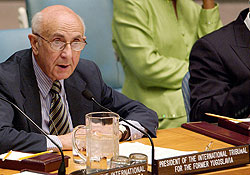
Judge Theodor Meron today addressed the UN Security Council in his dual capacity as President of both the ICTY and the Mechanism for International Criminal Tribunals (Mechanism or MICT). President Meron reported on the progress made in relation to the completion strategy of the ICTY and gave details of the launch of the Mechanism, encouraging the Security Council to reflect on the achievements of the former and the potential of the latter.
Turning first to the completion strategy of the ICTY, the President highlighted the excellent progress made in completing the Tribunal’s work, pointing to a number of cases which are expected to be completed faster than originally forecast. This includes the appeal judgement in the case of Momčilo Perišić which is expected to be delivered in early 2013, and the Popović et al. case which is anticipated to be completed by July 2014, several months earlier than initially predicted.
With regards to cases currently at the trial stage, the President informed the Security Council that the trial of Radovan Karadžić was expected to conclude by 31 December 2014, whilst the trials of Goran Hadžić and Ratko Mladić were forecast to finish by 31 December 2015 and 31 July 2016 respectively.
The President highlighted the number of challenges faced by the Tribunal in completing certain cases by the dates forecast and said: “I am well aware of the frustrations that Council members may feel when faced with shifts in forecasted completion dates, particularly when updated forecasts fall short of expectations. I share that frustration. However, I must underscore that predicting the completion dates for trial and appellate proceedings is more akin to an art than a science, and the forecasts the Tribunal provides must be understood in this context.” The President noted a number of challenges facing the Tribunal, including the complexity of the Tribunal’s cases, which can surpass that found in proceedings before national courts, as well as the Tribunal’s reliance on States’ cooperation with requests for evidence. The President also underscored the difficulties created by the departure of experienced staff members, which can delay preparation of judgements.
The President encouraged the members of the Security Council to consider any delays in the completion of the Tribunal’s work in their proper context, including the Tribunal’s wider achievements: “[D]espite some delays in the completion of the Tribunal’s trials and appeals, there is no doubt that the work accomplished by the Tribunal so far, and the legacy that it will leave, are already of profound significance (…) [T]he Tribunal has been instrumental in bringing about a new era of accountability and a new commitment to justice within the international community at large,” said the President.
Turning to the report on the work of the MICT, the President announced that the Mechanism, which commenced operation at the Arusha branch on 1 July 2012, was “already deeply engaged in fulfilling its mandate.” The President said that the preparations were well under way for the launch of the Hague branch, which will commence operations on 1 July 2013.
The President underscored how honoured he is to have been appointed President of the Mechanism: “In overseeing the creation and operations of the Mechanism, I (…) feel a particular responsibility to demonstrate to the international community that fairness and efficiency are not mutually exclusive concepts. Making international criminal justice sustainable in the long run depends in great part upon demonstrating that it can be an efficient, effective, and affordable proposition for the international community.”
The President explained that cases in which the notices of appeal are filed after 1 July 2013 will be heard by the Mechanism. This will include any appeals in the cases of Vojislav Šešelj, Radovan Karadžić, Goran Hadžić, and Ratko Mladić. The President underscored that, whilst the bulk of the Mechanism’s work will involve appeals, the Mechanism will be prepared to conduct trials of the three fugitives indicted by the ICTR whose cases have not been referred to national jurisdictions. The President urged the Security Council to assist the Mechanism in this respect: “The arrest and trial of these three fugitives is a top priority for the Mechanism.”
In concluding, the President thanked the members of the Security Council for their continuing support of both the Tribunal and the Mechanism: “The ICTY has already had a profound impact on the landscape of international criminal justice, and the Mechanism has the potential to build upon the achievements of its predecessors by creating a model institution that is effective and efficient and represents the international community’s strong commitment to the fight against impunity. I look forward to working with you to turn this potential into a reality.”
*****
ICTY Completion Strategy Report
Completion Strategy Reports archive
*****
International Criminal Tribunal for the former Yugoslavia
For more information, please contact our Media Office in The Hague
Tel.: +31-70-512-8752; 512-5343; 512-5356 - Email: press [at] icty.org
Follow ICTY on Facebook, Twitter and Youtube

